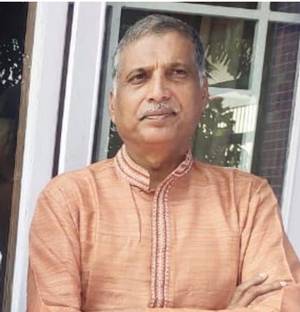 I heard the shocking news that Sri Ramakanth Gundecha, one of the famous Gundecha Brothers, died of a sudden heart attack en route to a concert. He was the younger brother of Sri Umakanth Gundecha, the celebrated duet Dhrupad singer and elder brother of Sri Akhilesh Gundecha, the Pakhawaj maestro. It is a shocking news for all classical music lovers in general and to Hindustani classical music lovers in particular. With his brother, he enthralled many music lovers of CTU in our annual Utsavam in 2008. Their music emphasized on the meditative aspects of our classical music.
I heard the shocking news that Sri Ramakanth Gundecha, one of the famous Gundecha Brothers, died of a sudden heart attack en route to a concert. He was the younger brother of Sri Umakanth Gundecha, the celebrated duet Dhrupad singer and elder brother of Sri Akhilesh Gundecha, the Pakhawaj maestro. It is a shocking news for all classical music lovers in general and to Hindustani classical music lovers in particular. With his brother, he enthralled many music lovers of CTU in our annual Utsavam in 2008. Their music emphasized on the meditative aspects of our classical music.
During 1962-66, period I was first exposed to stalwarts in Dhrupad like the Dagar brothers. I used to feel Dhrupad music was somewhat closer to our Carnatic music. Dagar brothers used to often perform at Mahajati Sadan in Calcutta during the annual Sadarang Sangeet Sammelan. There were many more khayal singers and instrumentalists than various other types.
In a visit to the Netherlands in the early eighties, I was given a recording of the music of Gundecha brothers by Kalpana, daughter of my friend Raghuraman. She said, “Uncle I am sure you will enjoy listening to their melody choked voice.” I asked her to play the cassette for a few minutes and I immediately felt that their music was anchored in perfect sruti which in itself created a serene atmosphere instantaneously. Their two voices would start like two planes trying to take off from the runway simultaneously in close union and would smoothly climb higher and higher into the musical atmosphere, a feat that one would feel humanly impossible to emulate.
I once came across an essay ( சங்கீத விஷயம்) — “Sangeetha Vishayam” by the famous Tamil poet Subramanya Bharatiyar. Apparently after listening to many Hindustani vocalists in Varanasi, he felt that the majority of Carnatic musicians, of his days, were lacking in voice culture. I could understand his complaint after listening to Gundecha brothers.
Thanks to two music lovers ( Madhusudhan Vedurmudi and Ravi Pariti), ardent supporters of CTU , I was excited to arrange their program during our annual Chicago Tyagaraja Utsavam. With two Tamburas on stage to be perfectly tuned, it took quite some time till they were satisfied. In a concert at National Girls High School Hall in Triplicane (1957) (1958), I have witnessed Madurai Mani Iyer (with Sri Lalgudi Jayaraman and Sri Palani Subramania Pillai) working hard for nearly 20 minutes tuning the Tambura to his satisfaction.
In 2008, before starting their regular concert at our annual Tyagaraja Utsavam, Gundecha Brothers paid their homage to Tyagaraja Swamy by singing a choornika from Tyagaraja Swamy’s opera, Prahlada Bhakti vijayam in Dhrupad style. Their Dhrupad composition on Lord Siva in the Hindustani raga Adana is still ringing in my ears. My daughter, Tara used to say, that whenever she was depressed, she found listening to their CD’s had a soothing effect in calming her depressed mood.
Even though some of the greatest musicians like Swamy Haridas and Tansen were Dhrupad singers, the music nurtured in royal courts moved the main trend of Hindustani music away from Bhakti oriented Dhrupad to a more secular or romantic musical types like Khayal and Thumri. Many musicians from Persia, who dominated Moghul courts, perhaps tried to influence the music towards more secular themes.
Needless to say, Dhrupad style of singing had an indelible stamp on the great composer Sri Muthuswamy Deekshitar. His stay in Varanasi and his exposure to some of the major Hindustani ragas probably triggered his creative urge to compose Carnatic kritis in many Hindustani ragas adapting the slow gait of Dhrupad compositions.
Deekshitar’s compositions like Parimala Ranganatham (Hameer Kalyani), Rangapura vihara (Brindavana Saranga), Jamboopathe (Yamuna Kalyani), Akhilandeswari ( Dwijavanti), Nandagopala (Yamuna Kalyani), Neerajakshi Kamakshi ( Hindolam) are all arresting our attention to appreciate the beauty of Dhrupad style in Carnatic system. Even though he would have listened to many Khayal singers in and around Varanasi, his choice to compose only in Dhrupad style shows his respect and appreciation for this meditative style that captures not only the essence of Hindustani ragas but conspicuously avoids Kampita Gamakas. Gundecha brothers have given several CD’s with short compositions in several ragas called the Dhrupad Mala series.
Apparently, Gundecha brothers have been running a successful Dhrupad Gurukul in Bhopal, Madhyapradesh with many foreign students deeply drawn into such a system. They have also established a Dhrupad school in Bengaluru, Chennai, Kolkata, Hyderabad, Mumbai and Delhi. It is very sad that India has to lose one of its greatest musicians and a true master and a great teacher of one of the oldest systems of Indian classical music.
In grief,
T.E.S Raghavan

